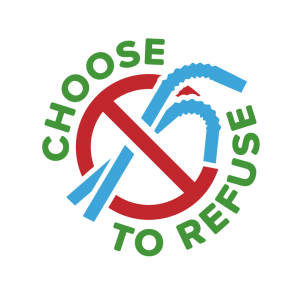 Recently I went to Panera with my mom for lunch. We placed our order, paid, and received our drink cups. I went to the fountain to fill our cups with passion green tea (the best green tea there is!) and sat back down. My mom stared at the cup and then up at me.
Recently I went to Panera with my mom for lunch. We placed our order, paid, and received our drink cups. I went to the fountain to fill our cups with passion green tea (the best green tea there is!) and sat back down. My mom stared at the cup and then up at me.
“Where are the lids?” she asked, “And the straw? Where is the straw?”
“You don’t need it,” I responded, gently taking a sip from my cup, as if to prove a point. She laughed and began to get up from the table.
“I understand,” she said “but I’m not there yet.”
“It’s just like drinking from a cup at home,” I point out.
Still not convinced, she walked over to the drink counter and retrieved a lid and a straw for her cup. “I recycle at home,” she said. “I do what I can.”
 Although the conversation ended there, I couldn’t help but think more about this situation over the course of the day. Although my mom understood the reason I refused a disposable lid and straw, she still “wasn’t there yet.” As a Community Educator, I have a responsibility to teach others how to be environmental stewards of our Earth, but how do I teach someone who is not ready to learn? The question sat with me for a while before I remembered the last sentence my mom said to me: “I recycle at home. I do what I can.” Although everything in me wanted to say, “Reduce, reuse, recycle, Mom. Reduce and reuse first, then recycle!” I knew that approach would not have been an effective way to communicate. It would not have gotten her any closer to refusing straws or reducing single-use plastics. Instead, I could have continued the conversation about recycling, encouraging her to make sure she was putting the right things in the bin and reinforcing an already positive environmental behavior.
Although the conversation ended there, I couldn’t help but think more about this situation over the course of the day. Although my mom understood the reason I refused a disposable lid and straw, she still “wasn’t there yet.” As a Community Educator, I have a responsibility to teach others how to be environmental stewards of our Earth, but how do I teach someone who is not ready to learn? The question sat with me for a while before I remembered the last sentence my mom said to me: “I recycle at home. I do what I can.” Although everything in me wanted to say, “Reduce, reuse, recycle, Mom. Reduce and reuse first, then recycle!” I knew that approach would not have been an effective way to communicate. It would not have gotten her any closer to refusing straws or reducing single-use plastics. Instead, I could have continued the conversation about recycling, encouraging her to make sure she was putting the right things in the bin and reinforcing an already positive environmental behavior.
Through my experience with community education, I have found this to be true of many people. It isn’t that people don’t understand the importance of being environmentally responsible; they may simply not be ready to take that extra step, to be that environmental overachiever – and I think it’s important to acknowledge that it’s okay. While it is important to educate as much as possible about how to be the best environmental stewards we can be (and all the benefits of doing so), I realize that it is equally important to meet people where they are. Some may not be willing to give up single-use plastics just yet, but they would be interested in recycling their plastic bags at the grocery store. Some may not be willing to give up their plastic straws, but they recycle what they can at home. Some may forget their reusable bags at home (we’ve all been there!), but understand the benefits of reusable bags over plastic bags.
Even if you’re not doing every environmental tip on our blog, are you doing something? If we all consistently and correctly did something we would have a large impact on our environment. Don’t get discouraged if you’re not the neighborhood environmental hero – every little bit counts. Whatever initiative you are currently doing, challenge yourself to continue as accurately and consistently as possible. If you recycle, recycle right. If you have pledged not to litter, put a litter bag in your car. If you don’t buy bottled water, bring your own water bottle every day. And maybe, when you’re ready, add a new initiative!
What is the old habit you have a hard time giving up for its eco-friendly alternative? What new initiative do you think you can incorporate into your lifestyle? Let us know on Facebook or Twitter.
Blog contributed by Lacie Wever, Community Education and Outreach Specialist with HRSD. Learn more at HRSD.com/classroom